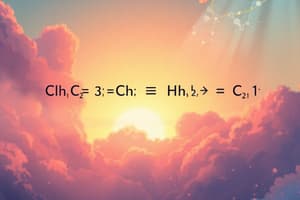Podcast
Questions and Answers
What is the core focus of chemistry?
What is the core focus of chemistry?
- Analyzing physical properties of matter
- Investigating chemical reactions (correct)
- Exploring energy transformation
- Studying atoms
How do chemical reactions shape our world?
How do chemical reactions shape our world?
- By creating unique molecules (correct)
- By controlling atmospheric pressure
- By altering the speed of light
- By causing earthquakes
What are elementary steps in chemical reactions?
What are elementary steps in chemical reactions?
- Steps occurring without any energy changes
- Steps involving only one type of collision (correct)
- Steps leading to the formation of identical molecules
- Steps involving all types of atoms
In the decomposition of hydrogen peroxide, what happens in the first step?
In the decomposition of hydrogen peroxide, what happens in the first step?
What do hydroxyl radicals form in the second step of the decomposition reaction?
What do hydroxyl radicals form in the second step of the decomposition reaction?
What fundamental skill is important when studying chemical reactions?
What fundamental skill is important when studying chemical reactions?
What principle must be followed to ensure conservation of mass and charge in a balanced chemical equation?
What principle must be followed to ensure conservation of mass and charge in a balanced chemical equation?
In balancing a chemical equation, why is it important for compounds that appear more than once to have identical coefficients?
In balancing a chemical equation, why is it important for compounds that appear more than once to have identical coefficients?
In the unbalanced reaction $NH_3 + O_2 o NO + H_2O$, how many oxygen atoms are present in $O_2$?
In the unbalanced reaction $NH_3 + O_2 o NO + H_2O$, how many oxygen atoms are present in $O_2$?
What is a limiting reagent in a chemical reaction?
What is a limiting reagent in a chemical reaction?
What does stoichiometry deal with in chemical reactions?
What does stoichiometry deal with in chemical reactions?
Why is it important to calculate yields in a chemical reaction?
Why is it important to calculate yields in a chemical reaction?
Flashcards are hidden until you start studying
Study Notes
Exploring Chemical Reactions
Chemistry is a fascinating science where matter interacts and transforms through various processes. At its core lies the study of chemical reactions, which are events that connect different kinds of atoms into unique molecules – or break them apart to form new elements. These transformations fundamentally shape our world, from the sparkling fireworks during celebrations to life's intricate biological mechanisms. Let's embark on this journey together by examining several crucial aspects of chemical reactions.
Elementary Steps of Reactions
The vast majority of complex reactions occur via multiple elementary steps, each involving just one type of collision between reactant particles. For example, consider the decomposition of hydrogen peroxide (H₂O₂) into water (H₂O) and oxygen gas (O₂):
[ H_2O_2 \rightarrow H_2O + O_2 ]
This reaction can be broken down into simpler stages:
-
A single H₂O₂ molecule breaks apart into two hydroxyl radicals (HO·), releasing energy in the process. [ H_2O_2 \rightarrow 2\text{ HO}· ]
-
Two hydroxyl radicals combine to produce water and oxygen gas.
[ 2\text{ HO}· \rightarrow H_2O + ½O_2 ]
By considering these individual interactions, we gain insights into how larger, seemingly complicated reactions unfold step-by-step.
Balancing Equations
One fundamental skill involved with studying chemical reactions is balancing equations. This practice ensures both conservation of mass and charge within a balanced equation. To balance a chemical equation, follow these principles:
- Coefficients beside compounds must equalize the number of atoms on either side.
- If a compound appears more than once in the same equation, it must have identical coefficients.
For instance, let's take the following unbalanced reaction:
[ NH_3+O_{2}\to NO+H_2O ]
To balance this equation properly:
- Count the numbers of nitrogen (N) atoms: 1 N atom (in NH₃) vs. 1 N atom (in NO). They already match.
- Check hydrogen (H) atoms: 3 H atoms (in NH₃) vs. 2 H atoms (in H₂O). Add another H₂O to make it 3 total H atoms: [ NH_3+O_{2}\to NO+2H_2O ]
- Verify the oxygen (O) atoms: 2 O atoms (in O₂) vs. 2 O atoms (in H₂O). All good!
Our final balanced equation is:
[ NH_3+O_{2}\to NO+2H_2O]
Stoichiometry
Stoichiometry deals with quantitative relationships among substances in a chemical reaction, which helps determine the amounts required to carry out reactions according to their balanced equations. Here are some essential key points related to stoichiometry:
- Limiting reagents control the outcome of a reaction. Once they are consumed completely, other reactants remain unused.
- Calculate yields based upon the amount of product formed versus what would ideally form under stoichiometric conditions.
Hopefully, you now possess a deeper understanding of chemical reactions, their underlying components, and how they contribute to shaping our world. As always, keep exploring chemistry's wonders because every discovery brings us closer to unlocking nature's incredible secrets.
Studying That Suits You
Use AI to generate personalized quizzes and flashcards to suit your learning preferences.




